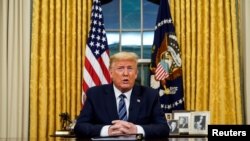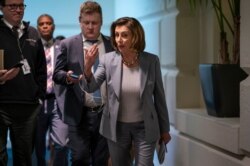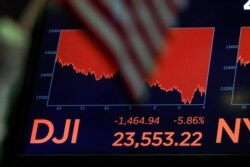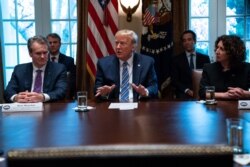After the World Health Organization declared the coronavirus a pandemic and U.S. stocks plunged into a bear market, U.S. President Donald Trump announced new economic measures and a European travel ban intended to calm an increasingly nervous nation.
In a nationally broadcast evening address, only the second of his 38-month-old administration, Trump said “we are marshaling the full power of the federal government and the private sector to protect the American people. This is the most aggressive and comprehensive effort to confront a foreign virus in modern history.”
The president stopped short of declaring a national emergency, which has been under consideration.
Trump said he is taking action that will allow the Small Business Administration to provide loans to small businesses in affected states and he is instructing the Treasury Department to defer tax payments for certain individuals and businesses.
Trump also called for Congress to provide immediate payroll tax relief.
“Alarmingly, the president did not say how the administration will address the lack of coronavirus testing kits throughout the United States,” said the top Democrats in Congress, House Speaker Nancy Pelosi and Senate Minority Leader Chuck Schumer.
“Tomorrow, we urge Republicans in the House and Senate to help immediately pass the Families First Coronavirus Response Act. The bill will include free coronavirus testing, paid emergency leave for workers, food security assistance, help to states overburdened by Medicaid costs, and strengthened Unemployment Insurance, among other much-needed measures to keep the American people safe,” they said.
The White House is working with Republican leaders on Capitol Hill on a stimulus package that could amount to hundreds of billions of dollars. House Democrats on Thursday are to put forward legislation of their own.
The Democrats control the House, while Republicans dominate in the Senate.
Trump also announced that effective Friday at midnight, travel from Europe to the United States would be suspended for 30 days.
“These restrictions will be adjusted subject to conditions on the ground,” Trump said. “There will be exemptions for Americans who have undergone appropriate screenings.”
The United Kingdom will be exempt from the temporary travel ban, Trump said.
The presidential order suspends the entry of most foreign nationals who have been in certain European countries at any point during the 14 days before their scheduled arrival to the United States.
The countries include Austria, Belgium, Czech Republic, Denmark, Estonia, Finland, France, Germany, Greece, Hungary, Iceland, Italy, Latvia, Liechtenstein, Lithuania, Luxembourg, Malta, Netherlands, Norway, Poland, Portugal, Slovakia, Slovenia, Spain, Sweden and Switzerland, according to the Department of Homeland Security, which clarified this “does not apply to legal permanent residents, (generally) immediate family members of U.S. citizens, and other individuals who are identified in the proclamation.”
“We can reduce the chance of infection, which we will significantly impede the transmission of the virus,” said Trump in the address, which lasted less than 10 minutes. “The virus will not have a chance against us. No nation is more prepared, or more resilient than the United States.”
European Council President Charles Michel said Thursday the EU would assess the situation and that “economic disruption must be avoided.”
“Europe is taking all necessary measures to contain the spread of the COVID-19 virus, limit the number of affected people and support research,” Michel said.
After Trump's address, White House Press Secretary Stephanie Grisham said the president will postpone his upcoming events in Colorado and Nevada “out of an abundance of caution from the Coronavirus outbreak.”
Trump called for politics and partisanship to be put aside.
Earlier in the day, the president held a White House meeting with the chiefs of top U.S. banks.
“We are going to get the problem solved,” the president said during the Cabinet Room meeting with the bankers, who pledged the readiness of their institutions to mitigate the economic pain from the spread of COVID-19 virus.
As Trump and the bankers met, the Dow Jones Industrial Average closed more than 1,400 points lower, a drop of nearly 5.9%, ending the 11-year bull run for Wall Street — its longest streak in history.
Despite that, the country is not facing a financial crisis, Citigroup Chief Executive Officer Michael Corbat said in the meeting.
“The banks and the financial system are in strong shape, and we are here to help,” he said.
“We are talking about various forms of stimulus,” Trump said.
“I would say that stimulus is appropriate,” responded Kelly King, chief executive officer of Trust Financial.
“I think the payroll tax” holiday proposal “would be great,” suggested the president.
“We’ve catalogued for the president all of his executive authorities, which are quite significant,” Treasury Secretary Steven Mnuchin said.
Just before journalists were ushered from the room, CNN White House correspondent Jim Acosta asked Trump, “What do you say to Americans who are concerned that you’re not taking this seriously enough and that some of your statements don’t match what your health experts are saying?”
The president responded, “That’s CNN. Fake news.”
Globally, there are more than 124,000 identified cases of COVID-19, which has killed nearly 4,600 people worldwide.
In the United States, there have been 33 reported deaths (29 of them in the state of Washington). There are more than 1,100 known infections in 38 of the 50 U.S. states.
Asked in a congressional hearing Wednesday if the worst is yet to come, Dr. Anthony Fauci, director of the National Institute of Allergy and Infectious Diseases, replied: “Yes, it is.”
As the hours progressed, more major U.S. businesses announced they would be requesting most employees telework, while a growing number of universities and other schools canceled classes, moving instruction online, in reaction to the virus.
“We’re still not completely sure how infectious it is, how easily it is spread. And I think that it’s wise to take these precautions,” Shelley Payne, interim director at the LaMontagne Center for Infectious Disease at the University of Texas at Austin, told VOA.
In Washington, D.C., local officials recommended that “nonessential mass gatherings, including conferences and conventions,” be postponed or canceled.
The recommendation from the District of Columbia will be in effect through March 31.
“Mass gatherings are defined as events where 1,000 or more people congregate in a specific location,” the city said in its health advisory.
Washington also became among the latest government entities to declare a state of emergency. Mayor Muriel Bowser also declared a public health emergency.











